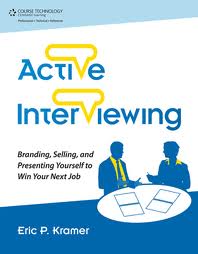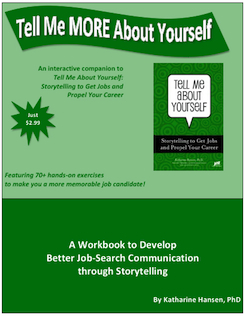Eric Kramer, whose specialty is presentation interviews, has just published a huge, comprehensive interviewing book, Active Interviewing. The book offers a full chapter, “Tell Stories That Engage and Persuade.”
He notes that stories in interviews should have a plot, theme, and dramatic  tension. The listener of a story in a job interview — the interviewer — should be able to say “This is a story about _______” upon listening to an interviewee’s story, Kramer says, and be able to identify the skill, accomplishment, trait, strength, or other qualification talked about. Because Kramer is a big fan of dramatic tension as a way to engage listeners in the job-seeker’s story, he touts the inclusion of barriers in interviewee’s story formulas; thus, Situation –> Barriers –> Action –> Result.
tension. The listener of a story in a job interview — the interviewer — should be able to say “This is a story about _______” upon listening to an interviewee’s story, Kramer says, and be able to identify the skill, accomplishment, trait, strength, or other qualification talked about. Because Kramer is a big fan of dramatic tension as a way to engage listeners in the job-seeker’s story, he touts the inclusion of barriers in interviewee’s story formulas; thus, Situation –> Barriers –> Action –> Result.
The author emphasizes a concern about interview stories that I’ve mentioned before in this space — a caution against “too much team.” “Being a good team member or leader is a critical skill in today’s companies,” Kramer writes, “However, the company is not hiring your team; it is hiring you.” The point is to give yourself sufficient credit when describing a team accomplishment, and to make your role clear.
Because I’m a bit obsessed with tracking and leveraging accomplishments, I especially appreciate Kramer’s list of “Success-Story Memory Joggers,” concise prompts that help job-seekers recall their achievements so they can craft stories about them. Here are a few from the list of 21:
- Accomplished more with the same/fewer resources? (How? Results?)
- Received recognition/special awards? (What? Why?) [I always prefer to say “earned” recognition/special awards because “received” implies passivity.]
- Increased efficiency? (How? Results?)
- Solved difficult problems? (How? Results?)
- Accomplished something for the first time? (What? Results?)
Kramer notes that stories provide an excellent way to answer the dreaded “What is your greatest weakness?” question because you can show the interviewer you are aware of your weakness and tell how you’re addressing it.
Kramer nicely ends the chapter with a list of why stories are effective in interviews.
 Kramer’s chapter dovetails nicely into the workbook I’m releasing at the end of this week (give or take). He talks about factors that ensure good story delivery in interviews — sincerity and wholeheartedness, enthusiasm, and animation. I’ll likely give a nod to these traits in my own chapter on story delivery in interviews in Tell Me MORE About Yourself: A Workbook to Develop Better Job-Search Communication through Storytelling. The workbook is an interactive companion to my book, Tell Me About Yourself: Storytelling to Get Jobs and Propel Your Career. The workbook will have roughly 100 pages of content, encompassing 70+ hands-on exercises that job-seekers can do to develop their job-search story skills. Should also be a great tool for instructors and workshop leaders who want to teach folks how to develop stories for the job search. One chapter addresses an area I didn’t even cover in Tell Me About Yourself — using story techniques to figure out a career path. The latest iteration of the cover design is at left. I’m selling the book (which will be a downloadable PDF) for the insane price of $2.99, payable through Google Checkout. Drop me an email to be notified of the actual publication release.
Kramer’s chapter dovetails nicely into the workbook I’m releasing at the end of this week (give or take). He talks about factors that ensure good story delivery in interviews — sincerity and wholeheartedness, enthusiasm, and animation. I’ll likely give a nod to these traits in my own chapter on story delivery in interviews in Tell Me MORE About Yourself: A Workbook to Develop Better Job-Search Communication through Storytelling. The workbook is an interactive companion to my book, Tell Me About Yourself: Storytelling to Get Jobs and Propel Your Career. The workbook will have roughly 100 pages of content, encompassing 70+ hands-on exercises that job-seekers can do to develop their job-search story skills. Should also be a great tool for instructors and workshop leaders who want to teach folks how to develop stories for the job search. One chapter addresses an area I didn’t even cover in Tell Me About Yourself — using story techniques to figure out a career path. The latest iteration of the cover design is at left. I’m selling the book (which will be a downloadable PDF) for the insane price of $2.99, payable through Google Checkout. Drop me an email to be notified of the actual publication release.
